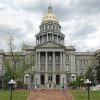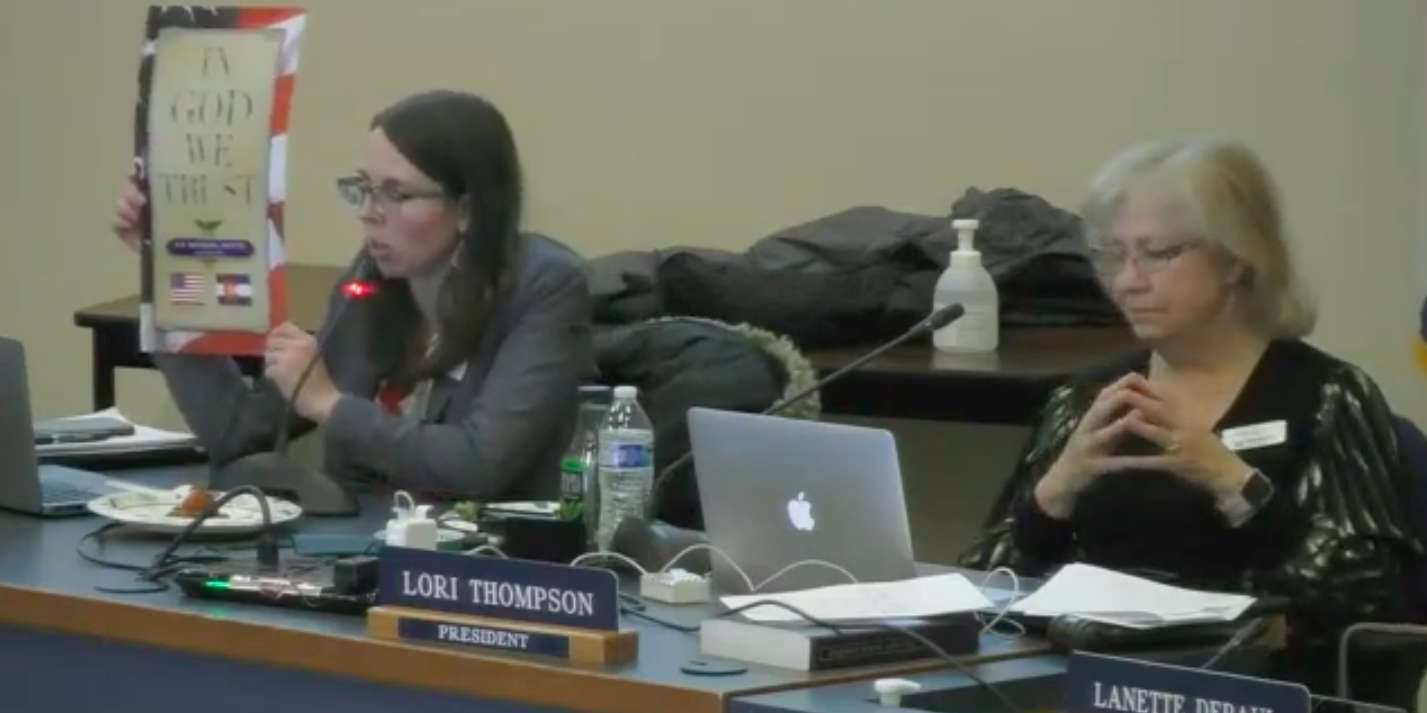The District 49 Board of Education in Colorado Springs last night approved a resolution to encourage the display in schools and other public buildings of the national motto “In God We Trust.”
The board voted 3-2 to approve the resolution, with newly elected board members Mike Heil and Marie Lavere-Wright opposed, and Lori Thompson, Jamilynn D’Avola and Deb Schmidt supporting.
“If you want what we’ve had — liberty, safety, a free and prosperous country — then you must recognize what gave us these liberties, and that is our Judeo-Christian biblical foundation,” said D’Avola. “We have taken God out of the public square and out of our schools, and we have lost God consciousness. Because of this, our moral compass has eroded, crime has skyrocketed, our freedoms and liberties are in jeopardy, [and] the mental health crisis has gone off the charts. If we want to save our nation and turn the ship around we must start with teaching our youth the history of our great nation.”
The effort to put “In God We Trust” in schools across the nation has been a chief aim of Project Blitz, a coalition of over 40 Christian right groups, including the Congressional Prayer Caucus Foundation, the National Legal Foundation, and Wallbuilders Pro-Family Legislators Conference. Mandatory display laws have already been passed in seven states: Arkansas, Florida, Louisiana, Mississippi, Tennessee, Utah, and Virginia. Several other states, such as Alabama, Arizona, and Pennsylvania, have laws which encourage the display of the state motto in classrooms.
“What made America great was our founders’ belief and reliance on God and the biblical principles that they put in our Declaration of Independence, in our Constitution,” said D’Avola. “This cannot be ignored or scrubbed out of our history books. This is why it is so important that we say the Pledge of Allegiance, post the flag in our classrooms, sing the national anthem, display our national motto and other historical documents, and teach our children the Constitution and Bill of Rights. With no belief in God and the Bible there would be no America.”
During public comment, residents and parents raised concerns about the impact of the resolution. “I strive to love and respect all people as Jesus commands us,” said D49 resident Cindy Carr. “I respect that everyone can make the choice to follow Jesus or to live the life they want based on the principles that they value. I’m very concerned about and opposed to the resolution on tonight’s agenda proposing to encourage the display of this motto in our schools. I see nothing of benefit for our schools, and I see harm that could occur. We have our values that we say are important to us — inclusion, we don’t want to create division — and I’m afraid this would lead us to some of those options. My faith does not lead me to believe that I need God placed on the walls in order to show my faith. I want to remind you that after an election there’s generally a goodwill period where the community watches to see the actions and priorities of a new board. What message would this board be sending? How would division and exclusion show the community what we want to achieve as a board? How would this resolution work toward our strategic goals of student outcomes, student behaviors, and especially restoring stakeholder trust? I oppose this resolution. I ask you to keep your focus on our local schools and our high priority items. I urge you tonight to vote no on this resolution.”
Dave Schultheis, a former member of the Colorado legislature, was concerned about the specific language of the resolution. “Initially I had this bill to require the motto to be posted in every classroom by the [chalk]board,” he said. “The board [of education] last time changed the words to ‘encouraging.’ The board is ducking, I believe, its responsibility, instead placing individual teachers on the defensive should any parents complain why they have it on their room and not on others. The school should never put teachers in a situation to defend the board’s decisions on things. I believe we should be using the word ‘requiring’ instead. This is the national motto. It’s like the flag, you don’t give the teachers an opportunity to decide whether they want the flag or not.”

Schultheis earned a reputation as a preeminent culture warrior in the Colorado legislature. In 2009, he created controversy by stating he hoped babies born from mothers with HIV were born with severe cases of AIDS to punish the mothers. He voted against Senate Bill 09-179, which required health care providers treating pregnant women to test those women for HIV unless they opt out. Schultheis claimed that HIV infection was the result of “sexual promiscuity for the most part”, and that the point of the proposed legislation was “to remove the consequences of poor behavior, unacceptable behavior, quite frankly. I’m not convinced that part of the role of government should be to protect individuals from the negative consequences of their actions.”
In 2010, Schultheis introduced the “Public School Religious Bill of Rights,” which would have allowed teachers to choose not to teach subjects such as evolution and sex education that might conflict with their religious beliefs, and allowed them to distribute religious material and display religious symbols in class, among other things. The bill failed to make it out of committee.
Heil attempted to amend the resolution. “Sandra Day O’Connor, in her Supreme Court ruling, declared that the motto represented ‘ceremonial deism,’ that is that it was essentially stripped of its religious connection,” he said. “Well, we just heard from members of the community, we heard from Jamilynn. I’ve seen a NextDoor thread that’s been almost at 300 posts, and everybody, regardless of whether they’re for or against it, is connecting it to religion. I’m not going to say that Sandra Day O’Connor is wrong in her interpretation, but I’m also not going to tell any of you that you were wrong in your interpretations either. Sixty-five percent of Coloradans identify as Christian, about five percent practice some other religion, two percent shrug their shoulders say, ‘I don’t know,’ and the rest, about 30 percent, don’t identify as any kind of religion at all. This is divisive, and so what I would like to do, I move to amend the resolution to focus on the part of it that unites us all under common shared values.”
Heil’s amendment would “encourage the display, in our schools and other public buildings, of documents of national historical significance,” as opposed to explicitly referencing “In God We Trust.”
Lavere-Wright supported the amendment. “I greatly prefer this version because it emphasizes all historical documents instead of calling out one that was begun in 1956 as the official document,” she said.
After an extensive discussion about the history of the founding of the United States, the board rejected Heil’s amendment.
“[D’Avola] and I are reading very very different histories,” said Heil. “I dispute the notion that we are founded on Christianity”
During an April, 2022 board meeting, D’Avola used her board comment time to read an excerpt from David Barton’s book, America’s Godly Heritage. The Southern Poverty Law Center describes Barton as “a self-styled ‘historian’ who has acted as a key bridge between the mainstream political right and radical-right religious ideology.” Barton is also the founder of Wallbuilders.
“This is just as theocratic as some of the other other things we see and it’s just as despicable as what the Communists did to the Christians,” said Lavere-Wright before the board voted to adopt the resolution.




